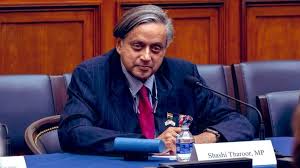‘I don’t go where I am not invited’: Tharoor accepts ‘differences of opinion’ with Congress leadership

Congress MP Shashi Tharoor has admitted that he shares differences of opinion with the party’s top leadership. When asked about his absence from recent strategy meetings, he said, “I don’t go where I’m not invited.”
His comment, though brief, has stirred debate across political circles. Many see it as a clear indication of internal tensions within the Congress party, especially at a time when it is trying to rebuild after electoral setbacks.
An Ongoing Pattern of Dissent
Tharoor has often voiced independent opinions. In 2020, he joined 22 other senior Congress leaders in writing a letter to Sonia Gandhi. The group, known as the G-23, called for internal reforms and stronger leadership.
Although some members have left the party or softened their stand, Tharoor has stayed. He even ran for Congress president in 2022 but lost to Mallikarjun Kharge. Despite the defeat, he received praise for encouraging a democratic contest.
Left Out of Key Meetings in Kerala
Over the past few months, Tharoor has been noticeably absent from major party discussions in Kerala. His absence has led to speculation that some leaders are sidelining him.
Tharoor addressed the issue without naming anyone. He explained that he doesn’t push himself into places where he isn’t welcome. This response highlights his approach to party dynamics—cautious but principled.
Reactions Within the Party
Some Congress insiders say Tharoor needs to engage more with party workers and leadership. A Kerala leader said anonymously, “He keeps distance, then questions why he isn’t included.”
Meanwhile, Tharoor’s supporters feel the party is wasting a valuable voice. On social media, many described him as a leader who speaks for India’s educated, urban voters. They believe Congress should use his experience more wisely.
Challenges for Congress Leadership
Congress has faced criticism for resisting internal debate. Tharoor’s comment reignites that conversation. Many political observers feel the party must welcome diverse views to grow stronger.
Political journalist Nistula Hebbar noted, “Leaders like Tharoor bring a modern, reformist image. Ignoring them sends the wrong signal.”
The Congress has been trying to portray itself as open and inclusive. But examples like this make many question whether it truly values internal democracy.
What Lies Ahead for Tharoor?
Despite the differences, Tharoor hasn’t shown any sign of leaving the party. He continues to represent Thiruvananthapuram and remains active in national discussions. Whether the party will involve him more in its key planning remains uncertain.
Tharoor has always said he wants to work for the Congress. But his recent statement shows clear frustration with being left out of important spaces.
Conclusion: Time for Introspection?
Shashi Tharoor’s words—“I don’t go where I’m not invited”—may sound polite, but they reveal deeper issues. They show that the Congress still struggles with managing internal differences.
For a party that seeks revival, listening to leaders like Tharoor is not optional—it’s necessary. Ignoring such voices could cost the party more than just a few headlines. It may affect how the public sees its future.






